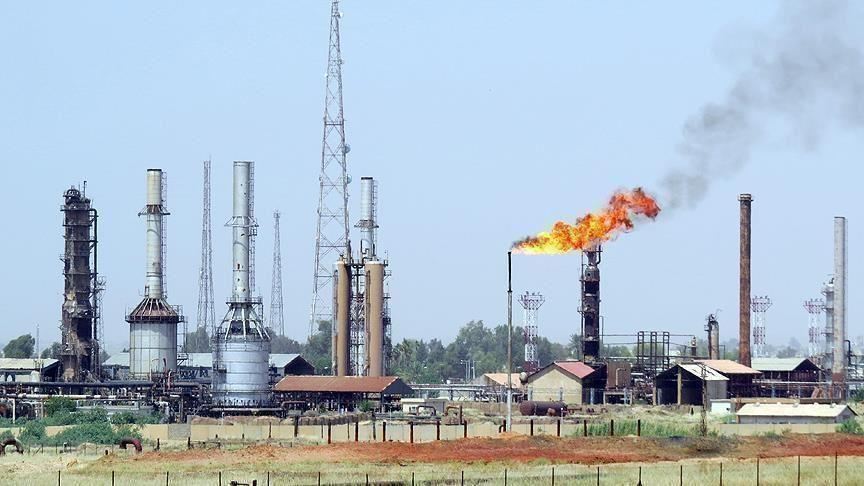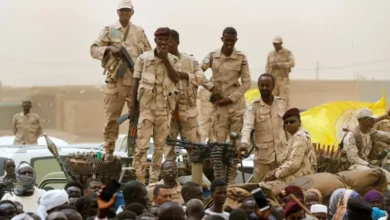Sudan: War Delivers a Coup de Grace to the Oil Sector

Almohagig: Nazik Shamam
The war that has been raging since April last year between the Sudanese army and the rebel Rapid Support Forces has unleashed a coup de grace on Sudan’s oil sector.
The sector was already suffering from difficulties and problems since Sudan entered the list of oil-producing countries in the 1990s, most notably weak investments and security challenges surrounding production sites.
However, with the conflict that has been going on in Sudan for ten months, oil production sites in the states of West and South Kordofan and oil installations were some of the most prominent targets targeted by the rebels through occupation, sabotage, and burning.
Last Sunday, the Khartoum refinery was exposed to a new fire, which destroyed all parts of the refinery’s internal unit.
The army accuses the Rapid Support rebels of the systematic destruction of the Khartoum refinery located in the Al-Jili area, north of Khartoum. In contrast, the rebels claim that the army is involved in this. In contrast, Brigadier General Nabil Abdullah, the official spokesman for the Sudanese army, denied what he described as the “false and patently untrue” allegations of the Rapid Support Forces regarding targeting Army forces destroyed the Al-Jili refinery in the north of Bahri city, Khartoum state, causing its destruction.
The army spokesman held the Rapid Support Forces responsible for any damage to the refinery.
The Khartoum refinery was not the first facility to be sabotaged since the beginning of the war. It was preceded by the Balila field located in West Kordofan State, which was attacked by Rapid Support rebels in October last year, which led to the cessation of production in the field.
However, according to press releases issued by the Sudanese Ministry of Oil and Energy, production resumed in November last year.
The Balila oil field is a partnership between Sudan and China, and its reserves are estimated at 1.3 million barrels. It produces heavy crude oil to feed the Khartoum refinery, which used to provide most of the country’s needs for oil derivatives. Its oil production was 14 thousand barrels per day before the outbreak of the current war in Sudan.
The Balila oil field is considered the production area most subject to successive attacks and disruption of work, as the region witnessed great security fragility at various times due to protests by youth groups from residents of the oil field areas.
“The oil sector will not return to what it was before” is how the Sudanese journalist specialising in oil affairs, Abdel Wahab Juma’a, summarises his vision of the future of the sector after the war.
He said, “The oil sector will collapse not only because of the war but also because of the problems that the Sudanese economy is already suffering from.”
He noted in his interview with (Al-Muhaqqiq) that it is extremely difficult to pump any investments into the oil sector at present.
He revealed the exit of the Indian and Malaysian companies that were investing in the oil sector, pointing out that their return to investing in the country is close to impossible.
He pointed out that even if the war stops, investment in the oil sector depends on several other issues, making it difficult for foreign companies to return to Sudan in the short term.
Juma’a stressed that the war destroyed plans to develop the oil sector in Sudan and said, “Instead of the sector developing forward, it suffered a very major setback.”
He explained that the oil installations within Khartoum State were subjected to the greatest targeting, especially the Khartoum Refinery, which is the largest oil facility within the capital and is the only refinery that was operating at total efficiency and that was supplying all economic sectors dependent on oil for its operation.
He revealed that the oil installations that were destroyed were estimated to cost between 10-15 billion dollars.
On the same level, a worker at the Khartoum Refinery, who preferred to withhold his identity, confirmed the destruction that occurred at the refinery. He told the investigator, “The refinery is now almost completely disabled, and there are no storage warehouses for any companies after they were destroyed.”
He pointed out that the only sector operating now is the transportation lines transporting crude from South Sudan and the Heglig field.
He pointed out that most of the workers had been evacuated from the refinery, while some were kept by the Rapid Support Forces to take shelter inside the refinery.
He warned that the disruption of the refinery contributed to the cessation of production from the Balila field, whose production was going directly to the refinery.
After the secession of South Sudan in 2011, Sudan’s oil production declined from 450,000 barrels per day to 60,000 barrels per day, which prompted the country to import more than 60 percent of its oil needs.





